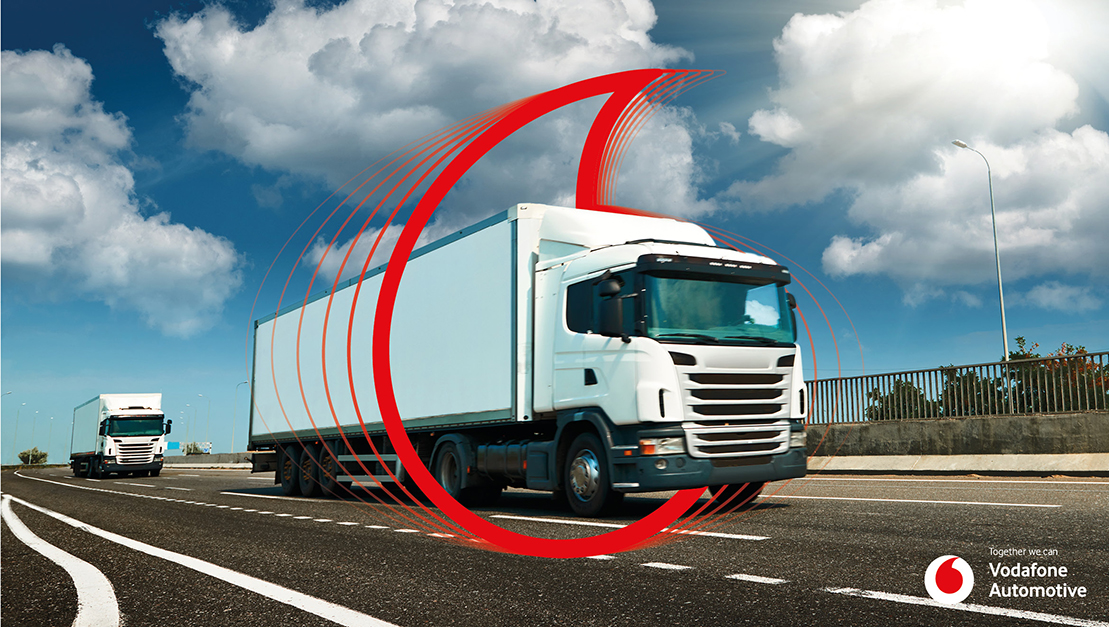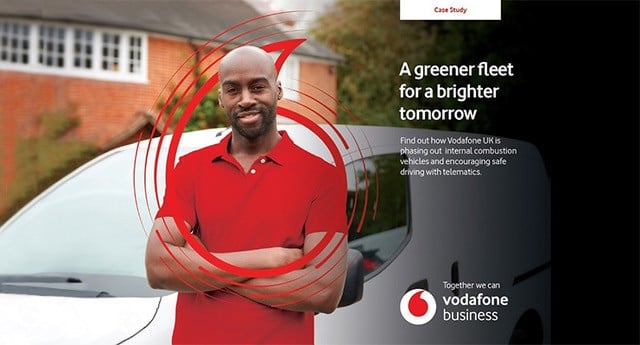Smarter, cleaner, safer – creating a trusted fleet
Vodafone UK has an ambitious target to eliminate carbon emissions from its operations by 2027 and achieve net zero by 2040. It has already moved 65% of its 1,300+ strong fleet over to electric or hybrid vehicles. Meanwhile, it’s also using telematics to plot smarter routes to maximise battery range and encourage safe driving on the roads. For Vodafone, it’s all about delivering the best possible experience to its customers and employees, while making the world a better place to live.
The challenge
Encouraging safe, cleaner driving
The Climate Change Committee, has identified that transport is now the largest source of emissions in the UK. Emissions from surface transport (non-aviation and shipping related transport) has remained largely unchanged since 1990 – it was responsible for 113 million tonnes of CO2 in 2019 (22% of overall UK emissions). Around 78% of surface transport emissions come from cars and light vans, with internal combustion engines1 i.e. petrol or diesel.
The Carbon Trust also recently analysed consumer data from Lloyds Banking Group and estimated that carbon emissions fell by 4.3 million tonnes, at the height of lockdown, in 2020. So, it’s obvious that finding alternatives to petrol and diesel vehicles, can play a big part in helping the planet to become greener and create a better world for everyone to live in2. Enter Electric Vehicles.
“Our telematics data shows that our engineers typically drive 150-170 miles a day,” explains Craig Login, Property Contract Manager, Vodafone UK. “Given that the best EV vans currently on the market only do about 200 miles a day in real-world conditions, that’s what creates the challenge for us.
“In 2020, 98% of all new cars ordered were either EV or PHEV vehicles. Around 65% of the car fleet is now EV or PHEV.”
Nevertheless, Vodafone has set an ambitious target to eliminate all carbon emissions from its operations by 2027, which means it needs to switch the company’s fleet of 1,355 cars and vans to non-fossil fuel energy sources. At the same time, it is ramping up its use of telematics for smarter route planning to reach charging points, while also encouraging safe driver behaviour.
The solution
Telematics at the heart
To bring its sustainable fleet ambitions to life, Vodafone uses its own telematics product and service – Vodafone Business Fleet Analytics (powered by Geotab). With this solution it can also gather real-time operational data and actionable insights into its own fleet performance, maximise vehicle performance, keep employees safe and manage routes with connected intelligence.
“Telematics data is crucial for us to understand the average mileage of each van per day, which allows us to categorise the usage and decide which type of electric model would best suit,” continues Craig. “We have also pulled data based on our vans which shows where the most frequently visited Vodafone sites are in the UK, which helps us make sensible investment choices based on employee locations.”
At the same time, an engineer can see and evaluate their own driving behaviour in the app, which helps Vodafone promote a safe driving culture. In-vehicle telematics can also monitor performance and alert the driver to any potential issues – preventing longer-term damage or more time-consuming repairs.
“Driving is a high-risk activity and we need to make sure that we’re giving our teams the tools to be as safe as possible,” continues Craig. “I’m reassured by the vehicle early warning notifications the team receive, telling them about their vehicle’s condition, so they can take action to fix an issue earlier – more vehicle uptime and less interruption to engineer time with our customers can only be a good thing.”
Vodafone UK is now well on its way to decarbonising its fleet of 1,355 vehicles to fully electric (EV) or plug-in hybrid electric (PHEV) and telematics proudly sits at the heart of its strategy.
“In 2020, 98% of all new cars ordered were either EV or PHEV vehicles,” remarks Craig. “Around 65% of the car fleet is now EV or PHEV. It’s great to know that we’re well on our way to being green.”
Why Vodafone?
- World leading fleet management product and services, for any fleet size
- Trusted by 35 global vehicle manufacturers
- Over 45 years’ experience in vehicle security and telematics
- A sustainable business supporting you into a greener future – reducing it’s own carbon dioxide emissions of 520 tonnes
- Managing 33 million connected vehicles across the world
- Lowering your fleet fuel costs & improving fleet performance
- Protecting your employees through safe driving behaviour
- Your data in safe hands – experts in sensitive data management & protection
About Vodafone
Vodafone UK is a technology communications company that connects people, businesses and devices to help our customers benefit from digital innovation. Its services span mobile, fixed line connections, home and office broadband and the Internet of Things (IoT). It has a strong track record as a tech pioneer, making the UK’s first mobile phone call, sending the first text message and making the UK’s first live holographic call using 5G in 2018. Today, Vodafone serves more than 18 million mobile and fixed-line customers in the UK.
As part of Vodafone Business, Vodafone Automotive, is a leading provider of mobility products and services, including InCar Telematics, Stolen Vehicle Tracking and Recovery, Usage Based Insurance and Fleet Management solutions. With direct operations in 9 countries and an extensive global footprint, we offer assistance and emergency services in 57 countries, including 45 in Europe. We’re trusted by over 35 global vehicle manufacturers and Tier One partners, insurance companies and fleet managers to deliver best-in-class solutions for increasingly safe, secure and accessible mobility.
vodafone.com/business/iot/automotive
- Connecting for Net Zero: Addressing the climate crisis through digital technology – A WPI report for Vodafone UK, September 2021
- Carbon Trust analysis of Lloyds Banking Group spending data, 2020 – Lloyds Banking Group Press Release, 26 August 2020




















